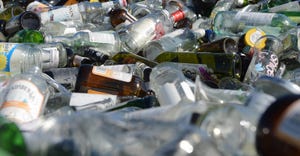City of Rochester, N.Y.'s Dranoff Helps Revamp Recycling Program
Dranoff was recently named a Waste360 40 Under 40 award recipient.
When the City of Rochester, N.Y., wanted to pilot a new recycling program, Josh Dranoff found the perfect opportunity to begin his career. Dranoff is the recycling coordinator with the City of Rochester. He graduated from SUNY Oswego with a degree in biology, and he earned a masters of science degree in sustainable systems from the Rochester Institute of Technology. Dranoff joined the Solid Waste Division as an intern in early 2015. Later that year, he was promoted to his current position.
“In a very short time, Josh has become a highly valued member of the Solid Waste Division by learning the various processes and procedures employed by the staff, developing insightful improvements and strategies, and implementing plans that are thoughtfully prepared,” says Karen St. Aubin, director of the operations bureau, City of Rochester. “His inclusiveness and consideration of others helps to foster a positive and fun work environment.”
Dranoff was recently named a Waste360 40 Under 40 award recipient. He spoke with Waste360 about the city’s plan to increase both the number of people recycling and the quality of its recycling program.
Waste360: What are some of your major responsibilities?
Josh Dranoff: We started a pilot program in 2015, and I helped with the implementation and the rollout with the materials and the program itself. We wanted to change the collection containers that people use for recycling. They were traditionally using the 8- or 12-gallon recycling boxes and they wanted to see how the 96-gallon recycling containers would work in the city. That was based on a study that was done in 2013 by a private firm, looking at our curbside collection system. They recommended that we go to a containerized system on an every other week collection basis.
There’s a total of 12 routes in the city, and we only experimented on two of them. We gave those who were actively recycling the 96-gallon containers in February 2015. We stayed on a weekly collection basis because we didn’t want to do too much change at once. I helped with some of the surveys that we used to make sure that all of the participants were accounted for and I responded to customer questions once we rolled out the containers because we were also introducing mixed recycling and that was the first time that residents were aware of that change.
That was another big piece, educating the residents about the fact that they didn’t have to separate the recyclable materials. I was out on the ground talking to residents and checking for contamination in the containers. Now, we’re rolling out this program to the full city. I’ve been involved with all of the small things that help residents to feel well-informed of the change. It is one of the biggest service changes in almost two decades.
Waste360: What do you wish that residents understood about recycling that you’re having to communicate to them?
Josh Dranoff: I think there may be a misconception about where recycling really goes and whether it’s getting recycled. I certainly understand that. I think part of that is making residents aware of what happens at the material recovery facility, what it is, how it operates, and where the material ends up after it’s sorted.
Waste360: In college, did you know you wanted to be in an environmental field, or waste management, specifically?
Josh Dranoff: I certainly did not expect to be in the waste management field. My undergrad focus was on wetland ecology. I wanted to dig deeper and get some more skills to measure the impact of new programs and technology and that’s how I decided to get my master’s in sustainable systems. When I was graduating RIT, I was imagining myself going to a private firm where I would quantify the environmental benefits of specific products and doing lifecycle assessments.
I got this internship and I started to realize that there is a lot of impact and change that can be made in the waste sector. I like knowing that I can reach out to people and communicate with them. That’s a reward that I’ve found.
Waste360: What led you to the environmental field originally?
Josh Dranoff: In high school I took a natural science course. My teacher was passionate about environmental issues so I started to learn about what’s going on in our world. When you’re in high school, you’re not really sure what you want to do so I ended up going to school for biology. I had a professor who put a lot of environmental issues into perspective and talked about the urgency. He said there’s a lot of issues that need to be addressed by our generation as we come into the world and get into our jobs.
I thought that if I’m going to be working for the rest of my life, I want to be working towards making the Earth a better place to live, from a health standpoint and from an environmental standpoint.
Waste360: What advice would you give to a young person entering this industry?
Josh Dranoff: I would say that if you look at the industry name “waste management,” you might think, ‘Oh, that’s garbage or recycling. That’s dirty.’ There’s a lot more to it than just that.
There’s certainly the operational side of the industry. If they want to be hands on, they can certainly work in that realm, and if they want to be more on the technical side, there’s room for that in terms of tracking the diversion from the landfill. There’s a lot of opportunity that you really don’t see from the outside. Especially for those who are in the environmental field and are looking to make an impact, I think this is the field to be in because we’re always going to have waste and materials that we’re not going to use. We’re always going to need to look at how we can use those materials for a better purpose. This industry is a good place to be.
About the Author
You May Also Like
.png?width=300&auto=webp&quality=80&disable=upscale)

